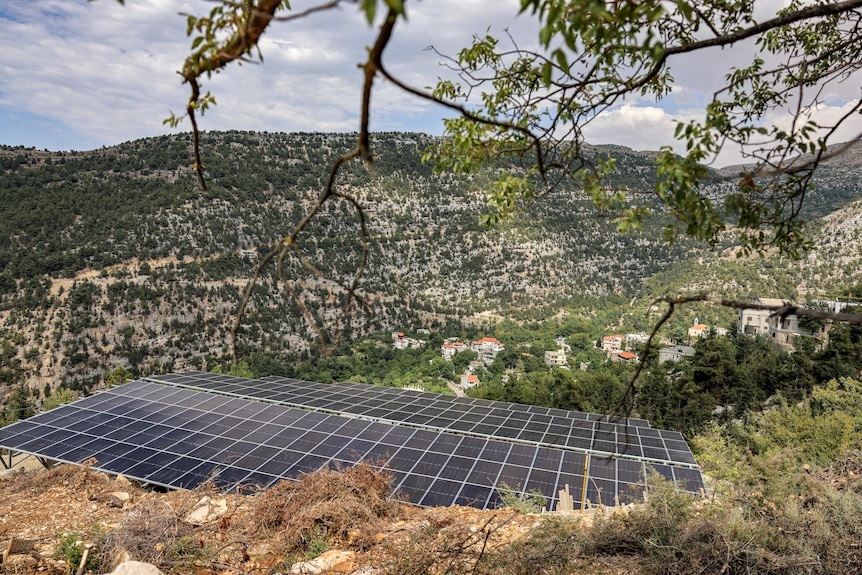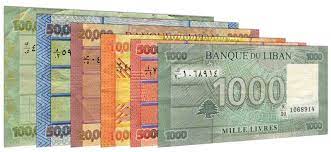by state.gov — Secretary of State Antony J. Blinken met yesterday with Lebanese Caretaker Prime Minister Najib Mikati in New York City. The Secretary emphasized the need to hold a timely presidential election in Lebanon and urged that the Prime Minister and other leaders implement key reforms needed to effect meaningful change, promote good governance, […]

@AzziSejean
الجميلُ أن تجدَ الأزماتُ حلولًا. السيِّئُ ألّا تجدَ الأزماتُ حلولًا. الأسوأ أن تَجدَ الأزماتُ حلولًا ولا تُطَــبّقُ. والكارثةُ أن تُغتالَ عَمدًا جميعُ الحلولِ ما إِن تلوحُ في الأفْقِ. لبنان اجتاز الحالاتِ الثلاثَ الأولى واستقرَّ للأسفِ في الحالةِ الرابعةِ. أصبح اللبنانيّون مُنتِجي أزَماتٍ وقنّاصِي حلول. تَعايشَ اللبنانيّون مع الأزَماتِ ووَجدوا لها الحلولَ أو التسوياتِ حين كانت فئاتٌ لبنانيّةٌ تسعى إلى تحسينِ مواقعِها في الدولة. أما حين قرّرت فئاتٌ لبنانيّةٌ أخرى تغييرَ موقِعِ لبنان وهُويّتِه واستملاكَه وبناءَه على صورةِ الأنظمةِ الدينيّةِ والاستبداديّة، أصبَحنا نَتعايش مع الأزَماتِ من دونِ الحلول. إنَّ المشاريعَ الدينيّةَ الأجنبيّةَ التي تَحمِلُها قِوى سياسيّةٌ لبنانيّةٌ، لا تتآلفُ مع الدستورِ اللبنانيِّ نصًّا وروحًا، ولا مع الميثاقِ الوطنيِّ فلسفةً وعُرفًا، لأنَّ مشاريعَها تَستدعي فِقهًا وفتاوى وتكاليفَ شرعيّةً لا دساتيرَ ومواثيق.
الإشكاليّةُ التي نُعاني منها في لبنان هي استحالةُ تطبيقِ حلٍّ سِلميٍّ أو حلٍّ عسكريّ كأنَّما لا بدّ من الجُرعتَين. ما عاد البَحثُ عن حلِّ أزْمةِ لبنان، بل عن حلِّ أزمةِ لبنان مع دولةِ حزبِ الله المنتشِرةِ على أراضيه وفي مجتمعِه ومؤسّساتِه وفي مجلسَي النواب والوزراء وتَمتلِكُ جيشًا بموازاةِ الجيشِ اللبناني. استحالةُ الحلِّ السياسيِّ ناتجةٌ عن قرارِ حزبِ الله بالإبقاءِ على جيشِه أيًّا يَكن الحلُّ السياسيّ، ما يؤدي إلى نشوءِ شعبَين: أحدُهما مسلَّحٌ مع مشروعٍ توسعيٍّ، والآخَرُ بدونِ سلاحٍ في كَنفِ الدولةِ اللبنانيّة. واستحالةُ الحلِّ العسكريِّ ناجمةٌ عن تحوّلِ أيِّ مواجَهةٍ عسكريّةٍ إلى حربٍ أهليّةٍ تُقسِّمُ البلدَ أو تُفتِّتهُ. ويُخشى أن تَقتصِرَ الحربُ على حزبِ الله والقِوى المسيحيّةِ السياديّة، فيما يَكتفي الآخَرون بِعدِّ الضحايا وإسداءِ النصائح. في الحالتين يبقى سؤالان أساسيّان: ما هو دورُ الجيشِ اللبنانيِّ تجاه استحالةِ الحلِّ السياسيِّ؟ وما هو دورُه في وقفِ المواجهةِ العسكرية؟
بين الأسباب التي تُعقِّدُ حلَّ القضيّةِ اللبنانيّةِ سَببان: 1) عدمُ ثقةِ الأطرافِ اللبنانيّة بمعادلةِ الحلِّ السياسيِّ ونتائِجه، إذ هناك أطرافٌ تَميل إلى حلٍّ يكون فيه غالِبٌ ومغلوبٌ بحكمِ وجودِ عنصرِ السلاحِ على طاولةِ المفاوضات السلمية. 2) اتّجاهُ أطرافٍ لبنانيّةٍ إلى ربطِ الحلِّ الداخليِّ بالتطوّراتِ الإقليميّةِ والدُولية، إذ يَظنُّ كلُّ طرفٍ لبنانيٍّ أنَّ “حليفَه” الخارجيَّ سيربَحُ إقليميًّا ودُوليًّا، وبالتالي سيربَحُ هو معه في لبنان. هكذا حَصَل سنواتِ 1920 و1943 و1982 و1989، إلخ… لكنَّ الثمارَ الإيجابيّةَ الـمُوَقّتةَ التي أعْطتها هذه الرهاناتُ سُرعان ما يَبِسَت وكانت وِزْرًا على أصحابِـها وأخصامِها معًا.
by cnn.com — Lebanon’s banks are to remain closed indefinitely due to ongoing “risks” to employees and customers, the Association of Lebanese banks announced Wednesday. The shutdowns follow a series of holdups across the country over the past month, with at least five separate banks held up by depositors last Friday alone in attempt to […]

by AFP — Ice cream is back on the shelves in the northern Lebanese village of Toula after two years of power cuts. Solar power has made its return possible. Lebanon’s economy collapsed in 2019 after decades of corruption and mismanagement, leaving the state unable to provide electricity for more than an hour or two per day. Last winter, residents of Toula barely had three hours of daily generator-driven electricity. A large area of solar panels surrounded by vegetation.
Solar power now helps keep the lights on for 17 hours, an engineer working on the alternative energy project said. Mini-market owner Jacqueline Younes said she was waiting for the first order of ice cream to arrive. “For two years the kids have been asking for ice cream, now it’s finally time,” she said. While many Lebanese rely on costly generators for electricity, a growing number of homes, companies and state institutions are turning to solar. They are not doing it for environmental reasons but because it is their only option.
by AP — A U.S. court has ordered the Lebanese militant group Hezbollah to pay millions of dollars in damages to a group of Americans who sued saying they were wounded by the group’s rockets during a war with Israel in 2006. The case was brought under the U.S. Anti-Terrorism Act and alleged that Hezbollah […]

By Najia Houssari — arabnews.com — BEIRUT: Lebanese banks began a three-day closure on Monday following a decision by the Association of Banks aimed at preventing break-ins and holdups by depositors. It comes after a series of high-profile incidents in bank branches, with depositors attempting to withdraw US dollar savings that have been frozen for three years. Caretaker Interior Minister Bassam Mawlawi described the bank break-ins in Beirut and other regions as “organized.”
The Association of Banks demanded that “necessary measures be taken” in order to ensure the safety of employees and customers, and to preserve depositors’ rights. Some bank central departments remained administratively functional on Monday, while the central bank’s Sayrafa platform was unaffected by the strike. The black market US dollar exchange rate failed to rise as significantly as expected as a result of the political and security turmoil in the country, with the rate standing at 38,350 Lebanese pounds. When branches reopen, a number of banks are planning strict self-protection measures by subjecting customers to inspections and only receiving those who have scheduled appointments.
President of the Lebanese Depositors Association Hassan Moghnieh warned that “the strike will not resolve the ongoing crisis. When work resumes next Thursday, banks might witness a new wave of holdups, which means that the solution resides elsewhere.” On Monday morning, a number of activists tried to break into the Justice Palace in Beirut in protest against the detention of activists who took part in bank holdups. The army prevented the families and activists from entering the palace. Screams were heard as protesters demanded the release of Mohammed Rustom and Abdul Rahman Zakaria, who were detained for breaking into Blom Bank to support depositor Sali Hafiz, who had earlier used a plastic gun to demand her deposit to treat her sick sister.

by Malek el Khazen: Many Lebanese companies that receive all fresh dollars and accept only fresh dollars are still paying their employees in Lebanese pounds. It’s a shame. Occasionally, they pay half of the salary in Fresh Dollars and the other half in Liras or “lollars”. Why is that? We can easily blame our government for failures and corruption. The fact that these employees are still paid in “liras” is a complete travesty. Stop pointing the fingers at the government, you are no better if you are getting paid in fresh dollars and are not paying your employees in fresh dollars. if we don’t start at the micro level and reject taking advantage of the new financial situation! You can begin by yourself.
by watchdogsgazette.com — Jad El Dilati – The only thing that an employer needs to do in modern-day Lebanon to attract job seekers is to write “paid in fresh dollars” in the job’s description, no matter how low the amount of dollars is. At a time when the country faces one of the world’s worst financial crises since the 19th century according to the World Bank when 50% of the country’s population is living below the poverty line, and with the unemployment rate on a sharp rise, finding a job that pays in fresh dollars, cash dollars, in Lebanon feels like winning the lottery. This is an alarming illusion. To understand why getting paid in fresh dollars today feels like a privilege, one has to take a step back and look at the general image existing in Lebanon. The type of salary that you earn comes down to what sector you work in. People working in the public sector, including teachers in public schools, security personnel, army members, and any job funded by the state, get paid in Lebanese liras (LBP).
Intra-sector differences arise among the private sector where most of the people working in private companies still get paid in Lebanese liras especially if the company is based in Lebanon. However, a good portion of private companies are paying their employees either a full salary or part of a full salary in fresh USD. Those companies are mainly tech companies who have foreign customers, companies that provide services to the Gulf Cooperation Council (GCC), and mostly any company that exports because those have become exceedingly scarce. Some companies that are currently paying their employees in USD include KPMG and PWC, both foreign. Almost all self-employed individuals also earn wages in LBP. Most Lebanese citizens work in the first two mentioned sectors or are self-employed, and thus earn their salaries in LBP. 95% of them do. This means that, if you are a person residing in Lebanon, earning fresh US dollars every month, at a time where one US dollar is worth 30,000 LBP, you are better off than 95% of the population. Amidst the continuous devaluation of the local currency, and the increasing difficulty in finding actual US dollar bills, earning fresh dollars seems like a prerogative. This feeling of privilege paved the path towards the savage exploitation of the Lebanese working class that is being witnessed today.
“Must-haves: 2 years of experience in business, 2 years of experience in marketing, experience in management, 4 years of business development experience. Expected salary: 200 fresh USD/ month!” An exclamation point is always added to make the low salaries look appealing. This was an ad for a telesales and marketing managerial full-time position for a company in Beirut that I saw on LinkedIn after less than a minute of scrolling. To put into perspective how substandard this salary is, it is necessary to compare it with the salary associated with the same job in other countries on one hand, and with the Lebanese minimum wage on the other hand while taking into account Lebanon’s current miserable conditions. Aِ marketing manager in the United States with this many years of experience would earn $126,560 a year which means they would be earning a monthly salary of $10,546. Thus, a marketing manager working in the United States would be earning 52 times the amount that an identical manager would be earning here. Certainly, one cannot compare the size of the Lebanese and the American economies. However, the private company offering the position in Beirut is run by a Lebanese expat whose revenue is entirely in “fresh dollars” because the company’s finances are all managed abroad. This implies that this employer is familiar with the market of such a job, is able to raise the wages to meet even a quarter of what should be earned yet chooses not to since they are well aware of the desperate need for fresh USD today.
NNA – Maronite Patriarch, Cardinal Bechara Boutros Al-Rahi, presided this morning over the annual Mass service devoted to the souls of the martyrs of the Lebanese resistance, held at “Our Lady of Ilige” Church in the town of Mayfouk – Al-Qattara – Jbeil district. In his homily, the Patriarch called for the formation of an […]
BEIRUT (Reuters) – Lebanese celebrated at home and abroad on Thursday, despite their homeland’s crises, as they woke up to the news that local female dance troop Mayyas had won the America’s Got Talent competition on U.S. television, bagging a $1 million prize. “We did it! Lebanon, this one’s for you,” the group posted on […]
by egypttoday.com — BEIRUT – Lebanese investors are interested in doing business in Egypt, said chairman of the Lebanese economic entities Mohamed Shuqair Sunday. Lebanese investments are strong and the Egyptian market is very promising, Shuqair said in statements to MENA before leading a delegation to the Egyptian-Lebanese business forum in Cairo earlier today. Shuqair […]



